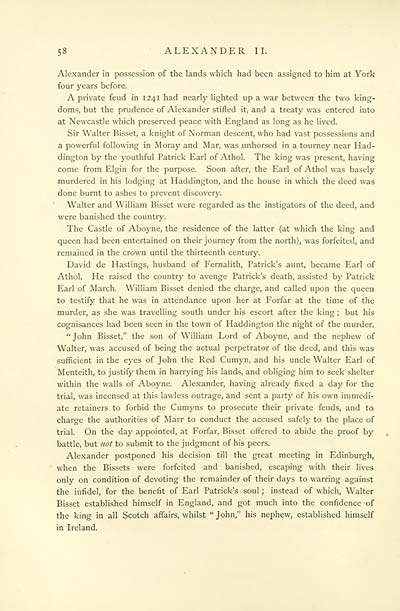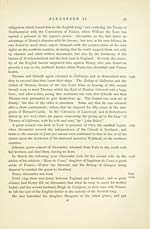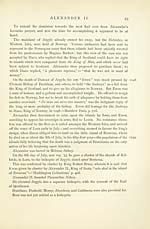Family records of the Bruces and the Cumyns
(70) Page 58
Download files
Complete book:
Individual page:
Thumbnail gallery: Grid view | List view

58 ALEXANDER II.
Alexander in possession of the lands which had been assigned to him at York
four years before.
A private feud in 1241 had nearly lighted up a war between the two king-
doms, but the prudence of Alexander stifled it, and a treaty was entered into
at Newcastle which preserved peace with England as long as he lived.
Sir Walter Bisset, a knight of Norman descent, who had vast possessions and
a powerful following in Moray and Mar, was .unhorsed in a tourney near Had-
dington by the youthful Patrick Earl of Athol. The king was present, having
come from Elgin for the purpose. Soon after, the Earl of Athol was basely
murdered in his lodging at Haddington, and the house in which the deed was
done burnt to ashes to prevent discovery.
Walter and William Bisset were regarded as the instigators of the deed, and
were banished the country.
The Castle of Aboyne, the residence of the latter (at which the king and
queen had been entertained on their journey from the north), was forfeited, and
remained in the crown until the thirteenth century.
David de Hastings, husband of Fernalith, Patrick's aunt, became Earl of
Athol. He raised the country to avenge Patrick's death, assisted by Patrick
Earl of March. William Bisset denied the charge, and called upon the queen
to testify that he was in attendance upon her at Forfar at the time of the
murder, as she was travelling south under his escort after the king ; but his
cognisances had been seen in the town of Haddington the night of the murder.
" John Bisset," the son of William Lord of Aboyne, and the nephew of
Walter, was accused of being the actual perpetrator of the deed, and this was
sufficient in the eyes of John the Red Cumyn, and his uncle Walter Earl of
Menteith, to justify them in harrying his lands, and obliging him to seek shelter
within the walls of Aboyne. Alexander, having already fixed a day for the
trial, was incensed at this lawless outrage, and sent a party of his own immedi-
ate retainers to forbid the Cumyns to prosecute their private feuds, and to
charge the authorities of Marr to conduct the accused safely to the place of
trial. On the day appointed, at Forfar, Bisset offered to abide the proof by
battle, but not to submit to the judgment of his peers.
Alexander postponed his decision till the great meeting in Edinburgh,
when the Bissets were forfeited and banished, escaping with their lives
only on condition of devoting the remainder of their days to warring against
the infidel, for the benefit of Earl Patrick's soul ; instead of which, Walter
Bisset established himself in England, and got much into the confidence of
the king in all Scotch affairs, whilst " John," his nephew, established himself
in Ireland.
Alexander in possession of the lands which had been assigned to him at York
four years before.
A private feud in 1241 had nearly lighted up a war between the two king-
doms, but the prudence of Alexander stifled it, and a treaty was entered into
at Newcastle which preserved peace with England as long as he lived.
Sir Walter Bisset, a knight of Norman descent, who had vast possessions and
a powerful following in Moray and Mar, was .unhorsed in a tourney near Had-
dington by the youthful Patrick Earl of Athol. The king was present, having
come from Elgin for the purpose. Soon after, the Earl of Athol was basely
murdered in his lodging at Haddington, and the house in which the deed was
done burnt to ashes to prevent discovery.
Walter and William Bisset were regarded as the instigators of the deed, and
were banished the country.
The Castle of Aboyne, the residence of the latter (at which the king and
queen had been entertained on their journey from the north), was forfeited, and
remained in the crown until the thirteenth century.
David de Hastings, husband of Fernalith, Patrick's aunt, became Earl of
Athol. He raised the country to avenge Patrick's death, assisted by Patrick
Earl of March. William Bisset denied the charge, and called upon the queen
to testify that he was in attendance upon her at Forfar at the time of the
murder, as she was travelling south under his escort after the king ; but his
cognisances had been seen in the town of Haddington the night of the murder.
" John Bisset," the son of William Lord of Aboyne, and the nephew of
Walter, was accused of being the actual perpetrator of the deed, and this was
sufficient in the eyes of John the Red Cumyn, and his uncle Walter Earl of
Menteith, to justify them in harrying his lands, and obliging him to seek shelter
within the walls of Aboyne. Alexander, having already fixed a day for the
trial, was incensed at this lawless outrage, and sent a party of his own immedi-
ate retainers to forbid the Cumyns to prosecute their private feuds, and to
charge the authorities of Marr to conduct the accused safely to the place of
trial. On the day appointed, at Forfar, Bisset offered to abide the proof by
battle, but not to submit to the judgment of his peers.
Alexander postponed his decision till the great meeting in Edinburgh,
when the Bissets were forfeited and banished, escaping with their lives
only on condition of devoting the remainder of their days to warring against
the infidel, for the benefit of Earl Patrick's soul ; instead of which, Walter
Bisset established himself in England, and got much into the confidence of
the king in all Scotch affairs, whilst " John," his nephew, established himself
in Ireland.
Set display mode to:
![]() Universal Viewer |
Universal Viewer | ![]() Mirador |
Large image | Transcription
Mirador |
Large image | Transcription
Images and transcriptions on this page, including medium image downloads, may be used under the Creative Commons Attribution 4.0 International Licence unless otherwise stated. ![]()
| Histories of Scottish families > Family records of the Bruces and the Cumyns > (70) Page 58 |
|---|
| Permanent URL | https://digital.nls.uk/95071826 |
|---|
| Description | A selection of almost 400 printed items relating to the history of Scottish families, mostly dating from the 19th and early 20th centuries. Includes memoirs, genealogies and clan histories, with a few produced by emigrant families. The earliest family history goes back to AD 916. |
|---|

